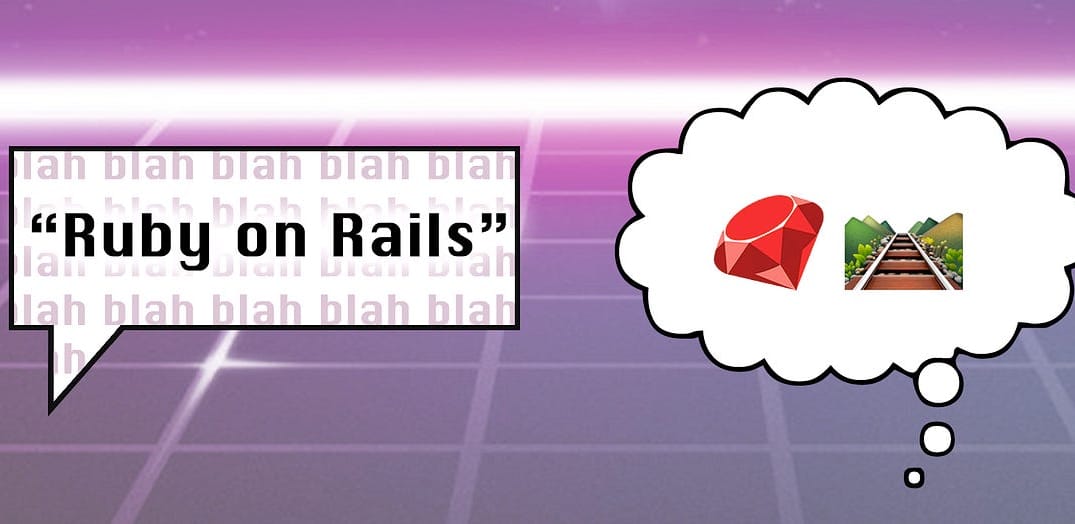
Because this is the Bay Area, even those of us who aren’t techies likely know people who spend their days writing code, building apps and doing the mysterious work that justifies three meals a day prepared by a private chef. Yet the everyday tech jargon you might overhear at a San Francisco café is oft-incomprehensible to outsiders. I asked a bunch of non-tech people around the country to define some commonly used tech terms, and the results were hilarious.

Rich, Philadelphia — Business Analyst
Ruby on Rails:“When you take your friend Ruby to the club, and she has too many drinks.”
Growth Hacking: “Is this like life hacking for people who want to be taller?”
Chaos Monkey: “2016’s answer to the phrase ‘bull in a china shop.’”

Jasmine, Los Angeles — TV Producer
Chaos Monkey: “For sure, someone’s Playa name.”
Ruby on Rails: “Feels like a very specific Urban Dictionary entry about fucking a crazy girl on her period.”
Ship It: “What happens when you are rooting for two characters’ romance in a TV show. You ship them. I know because kids say that on the tumblr.”
Microblogging: “The newest Instagram feature, because a picture isn’t worth a thousand words anymore.”

Olivia, Houston , TX— Paper Artist
Chaos Monkey: “That’s that thing when my dad’s friend bought a monkey in Hong Kong and got it drunk to get it through security but then got it confiscated instead. That’s a true story, by the way. He almost got fired from his job.”
Meta Elements: “Gold. Silver. Copper. You know—they’re made of meta.”
Microblogging: “Those are tiiiiiiny blogs.”
Open Source: “That’s a situation that calls for Neosporin. ‘Oooo, you got a Band-Aid? I got all these open source.’”
Ruby on Rails: “I think that’s from the Wizard of Oz.”

Ryan, Fresno — Business Owner
MVP: “Machines vs. people.”
Open Source: “This is non-copyrighted software.”
Microblogging: “Twitter?”
CTA: “You spelled ‘cat’ wrong.”
Growth Hacking: “I suppose this has nothing to do with deforestation?”
Cognitive Load: “Sounds like a brain in the bathroom.”
Ruby on Rails: “This is a computer language. I hear speaking it pays well.”
[Subscribe to The Bold Italic and get articles like this in your inbox once a week.]

Caitlin, New Jersey — Leasing Manager
Chaos Monkey: “New Ben and Jerry’s flavor?”
Open Source: “Isn’t Wikipedia an open source?”
CTA: “Cats taking action — an advocate group for the cats of the Internet.”
Growth Hacking: “I have no clue, but this doesn’t sound good at all and reminds me of a compound wart commercial.”
Meta Elements: “The things that make up the cloud?!”
Cognitive Load: “Do you blow your cognitive load often? Maybe how much data something can hold?”
Cranking on Work: “Working so hard you need a nap.”
Ruby on Rails: “Eating grapefruit on a train!!!”

Brooke, Los Angeles — Personal Trainer
Disrupt: “A company that is disruptive takes an industry that is stable and does something new and fucks with everyone’s shit.”
Cognitive Load: “How hard something is for your brain to process, or when you think on the toilet.”
Ship It: “Print it, pack it, ship it, FedEx. Or in a TV show when you want two characters to bone.”
Chaos Monkey: “Someone in the office who is trying to be a dick and make everyone else’s life difficult.”
Microblogging: “Isn’t that just tweeting?”
Open Source: “You get to use other people’s programs for free and change them.”
Cranking on Work: “Hitting it real hard.”

Frank, New York City — Teacher
Growth Hacking: “What those Soylent people are trying to do to avoid eating.”
Disrupt: “Enter into a market to try and make money from people who are doing it wrong, in your opinion.”
Chaos Monkey: “Sounds like a Sonic the Hedgehog character.”
Microblogging: “I think this is what Twitter is.”
CTA: “Capitalism takes all.”
Ruby on Rails: “How they program roller coasters.”
Agile: “The way I have to be when my iPhone 7+ slips out of my hand.”
Open Source: “Anyone can use the code to make whatever they want.”

Jesse, New York City — Videographer
Disrupt: “I can only assume this is a new, clever term for hacking. It makes me think of a ’90s movie where a hacker is breaking into the Pentagon while a stream of green letters and numbers flow down his computer screen in front of his gel-spiked hair.”
Chaos Monkey: “I know these are tech terms, but this just makes me think of a monkey that got into a banana store and is just absolutely wreaking havoc.”
Ship It: “Ship it good!”
MVP: “Most valuable processor. My computer definitely doesn’t win this award, since it has crashed two times since last month.”
Open Source: “I know this one! This is when a company makes its code accessible for other programmers to modify or add to, right?”
Microblogging: “This is when people blog about stuff on really tiny computers or blog about things in really short sentences.”
CTA: “I have absolutely no idea about this one. Maybe chief technology application? Computer teaching assistant? Code tracking algorithms? Ooh, that last one actually sounds pretty good.”
Growth Hacking: “This sounds like such a buzzword. It sounds like a really cool, fancy process but in reality probably refers to something super-lame, like expanding your user base or growing your company.”
Meta Elements: “This is definitely a superhero name! It’s a bird! It’s a plane! It’s META ELEMENTS!”
Ruby on Rails: “Dorothy when she decided that her ruby slippers couldn’t actually transport her home, and she had to buy a train ticket back to Kansas.”

Kelsey, Oakland — Office Manager
Agile: “I had no idea this was tech related at all. To be able to move quickly and swiftly, most likely in an office TRX or boot-camp class.”
MVP: “Most valuable player, probably the one who hits quota (whatever that is) multiple months in a row. Or a tech bro who succeeds in more places than just the cubicle.”
Open Source: “Wikipedia.”

Robbie, Los Angeles — Video Producer
Agile: “Able to pivot tasks easily.”
MVP: “Most pivotal member on a project.”
CTA: “No clue. Cheese taste analysis.”

Hadley, Philadelphia — Environmental Educator
Chaos Monkey: “This is definitely the person in the office who uses the last of the toilet paper and doesn’t refill it.”
Open Source: “When you did a good job on a research project and want to make your findings available for everybody, especially grad students who need to do lots of literature reviews.”
Ruby on Rails: “When you have a cool idea but it has high-stakes consequences. Gotta grab that proverbial ruby before the train comes down the tracks!”

Jackie, Florida — My Mom
Chaos Monkey: “A virus.”
Microblogging: “Writing a small article.”
CTA: “No clue.”
Growth Hacking: “Hacking a lot of people.”
Cranking on Work: “Living by what you do for a living.”
Meta Elements: “No clue.”







